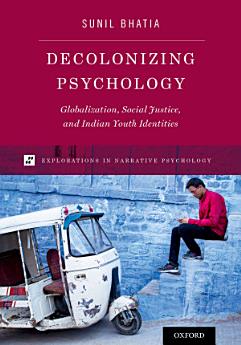Decolonizing Psychology: Globalization, Social Justice, and Indian Youth Identities
září 2017 · Oxford University Press
E‑kniha
216
Stránky
family_home
Vhodná
info
reportHodnocení a recenze nejsou ověřeny Další informace
Podrobnosti o e‑knize
In recent years, the news media has directed a significant amount of attention to the effect of globalization on the second most populous nation in the world: India. With the emergence of new economic opportunities and the influx of foreign popular culture and commodities, India has experienced an enormous sea of change in the last few decades. In Decolonizing Psychology: Globalization, Social Justice, and Indian Youth Identities, author Sunil Bhatia focuses on the psychological tensions that these changes have brought upon Indian youth today. Drawing on dozens of interviews, Bhatia offers readers a compelling glimpse and analysis of how these youth populations are engaging with the emerging presence of globalization in their day-to-day lives. As Bhatia explains, young Indians use the term 'world class selves' as a way to identify and describe the ways in which globalization has strengthened their standing in the world. By frequenting urban cafes and bars, watching American television and cinema, traveling abroad, and regularly consuming foreign commodities, Indian youth absorb the westernized culture and view themselves as peers to their western counterparts. At the same time, however, these young Indians proudly hold onto their homeland's traditions governing family and religious values. With remarkable clarity and nuance, Bhatia sheds an important light on the universalizing power and the colonizing dimensions of Euro-American psychology. By integrating insights from postcolonial, narrative, and cultural psychologies to explore how Euro-American scientific psychology became the standard approach, Bhatia reminds readers of whose stories are not being told, what knowledge is not being considered, and whose lives are not included in the central understanding of psychology today.
O autorovi
Sunil Bhatia is a professor of human development at Connecticut College. His research focuses on the development of self and identity within the postcolonial contexts of migration, globalization, neo-liberalization, and the formation of transnational diasporas. In 2014, he was elected a Fellow to the American Psychological Association for his outstanding local, national, and international contributions to the field of psychology. In December 2014, he was selected by the American Psychological Association for the prestigious APA 2015 Humanitarian of the Year award.
Ohodnotit e‑knihu
Sdělte nám, co si myslíte.
Informace o čtení
Telefony a tablety
Nainstalujte si aplikaci Knihy Google Play pro Android a iPad/iPhone. Aplikace se automaticky synchronizuje s vaším účtem a umožní vám číst v režimu online nebo offline, ať jste kdekoliv.
Notebooky a počítače
Audioknihy zakoupené na Google Play můžete poslouchat pomocí webového prohlížeče v počítači.
Čtečky a další zařízení
Pokud chcete číst knihy ve čtečkách elektronických knih, jako např. Kobo, je třeba soubor stáhnout a přenést do zařízení. Při přenášení souborů do podporovaných čteček elektronických knih postupujte podle podrobných pokynů v centru nápovědy.





